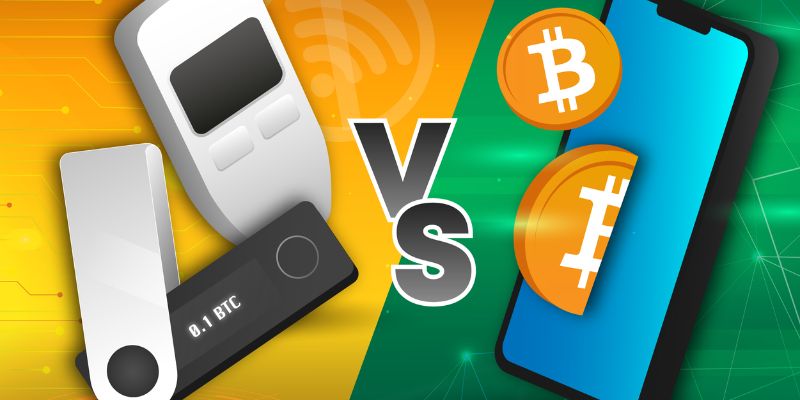In the face of rising digital threats, weighing hardware wallet vs software wallet options is crucial for crypto safety. Both store your digital wealth, but the method they do it can change the game for security. Simple software wallets provide easy use, but could leave your assets at cybercriminals’ mercy. Hardware wallets, akin to digital vaults, offer ironclad protection for peace of mind. Ready to dive in? Let’s unravel the knots of cryptocurrency wallet security and find out which type will seal your coins away from prying eyes.
Understanding the Basics of Cryptocurrency Wallets
Defining Hardware and Software Wallets
Let’s dive right in. A hardware wallet is a physical device that stores crypto offline. Think of it as a high-tech safe. It keeps your crypto away from the internet and out of harm’s way. Brands like Ledger, Trezor, and KeepKey make popular ones. Software wallets are programs you install on your device, connected to the internet. They include mobile apps and desktop options.
Hardware wallets are better for long-term storage. They are designed for keeping large amounts of crypto safe over time. Software wallets are for easy access and daily use. They are great for spending and trading regularly.
Cold Storage Security vs. Online Accessibility
“Cold storage” means you store your crypto offline. It’s offline, safe, and away from hackers. Hardware wallets provide this cold storage security. Cold storage is key for private key protection. Keep in mind, hardware wallet setup can take more steps. Yet, it’s worth it for the security you get.
On the other hand, software wallets offer quick access. You can send and receive crypto fast. Still, they face more risks. They can fall victim to malware and hacker attacks. Always back up your wallets, friends. Be it hardware or software, have a recovery plan. Offline vs online wallets also come down to what you need more – safety or speed.
Remember, you control your digital asset security. Pick a wallet that suits you! Whether you go for a Ledger wallet for hardware security or a mobile wallet app for convenience, know the risks. Secure cryptocurrency storage means understanding these trade-offs. So, ask yourself, do you want cold storage security, or do you need your crypto ready at a click?
In the end, your crypto’s safety is in your hands. Use wallet security features like two-factor authentication. Consider multisignature wallets for extra layers of safety. And yes, the hardware wallet cost might be higher, but can you really put a price on peace of mind?
In summary, think of your needs first. Whether it’s long-term investment or daily spending, choose the right wallet type. Keep your keys safe, and you’ll sleep better at night, trust me.
Comparing Security Features of Hardware and Software Wallets
Physical Crypto Storages and Private Key Protection
Let’s dive into hardware wallets first. They are on the buzz now for one big reason: security. They keep your keys offline, away from hackers. Think of them like your personal crypto safe. They are small devices you can connect to your computer when you need to. But what about when they’re not in use? They’re locked away, safe and sound, in cold storage. This means your private key, the magic pass to your coins, is offline. It’s away from the online world’s nasty bugs and thieves.
But it’s not just about being offline. These gadgets, like the popular Ledger or Trezor, are made to fight off attacks. They have layers of security. Your key stays encrypted within the device. Even if you connect to a computer with malware, the bad stuff can’t get to your key. Just think, every time you do a transaction, you get to check the details on your hardware wallet. You confirm them by pressing actual buttons on the device. This makes sure that it’s really you calling the shots, not some hacker from afar.
Now, how do these compare to software wallets? Software wallets are apps on your phone or computer. Yes, they keep your key too. But here’s where it gets tricky. They are always online, which we call hot wallets. Hot wallets are like carrying your cash in your back pocket. It’s super handy but also super risky. Someone could pick that pocket any time! They are more exposed to malware. If your computer or phone gets hit, your key could be at risk.
Multisignature Options and Two-Factor Authentication
Now, don’t count out software wallets just yet. They’re stepping up their game. Many offer two-factor authentication (2FA). This means you need two proofs to get in, like a password and a code on your phone. Think of it as a double-lock for your digital dollars.
Multisignature options are worth talking about too. They’re like a lock that needs multiple keys to open. Imagine you have a treasure chest. Instead of one lock, you have three! You need three keys to get in. This is great for groups who manage crypto together. They make sure one person can’t run away with the loot.
Both hardware and software wallets can have these features. But hardware wallets often combine them with cold storage security. This gives you layers and layers of protection. You can set up multiple locks, even for just yourself. But this also means more steps to send your coins. You’ll have to weigh security against the ease of use. It’s like choosing between a big safe or a handy wallet. Which one feels right for your needs?
Now, remember to back up your wallet, no matter which type you pick. This is where something like paper wallets come in. They let you write down your key and store it away, just in case. But, don’t lose that paper! If you do, it’s like losing your only key to your safe. Always have your backup plan ready. It’s a vital part of key management solutions for both wallet types.
In the end, it’s all about how much risk you can take. If you’re stocking up lots of coins, hardware might be best. If you trade often, maybe the quick click of a software wallet works for you. Every choice has its trade-offs. It’s up to you to find that sweet spot between safety and easy access.
Setting Up and Managing Your Wallet
Hardware Wallet Setup and Backup Procedures
Setting up a hardware wallet is like setting a safe. You write down your recovery seed on paper. This is a unique set of words. It opens your wallet if needed. Keep this paper safe. It’s the key to your coins. Next, make a PIN code. It should be strong. Don’t share it with anyone.
Now, plug in your Ledger or Trezor. Follow the steps on the screen. These steps are there to keep your coins safe. You’ll need to set up the recovery seed here. Remember, this is important. After this, store your device. Put it somewhere only you can find. This keeps your crypto safe from thieves.
Never tell anyone your seed or PIN. Even if they say they’re from the company. Scammers can trick you. Write down your seed on two papers. Put them in different places. This way, if one gets lost or damaged, you still have a backup.
Software Wallet Access and Vulnerability to Malware
Software wallets are different. They live on your computer or phone. They need proper security, too. This means a strong password. Use one that’s hard to guess.
Secure your computer or phone. Use antivirus programs. And always think before you click. Scammers use malware to steal crypto. Malware is like a sneaky thief. It can get into your wallet, without you knowing. So, be careful.
Back up your software wallet. Some use a seed phrase like hardware wallets. Others may use different methods. Make sure you know how to back yours up. This is vital to get your crypto back if something goes wrong.
Software wallets can face more risks. This is because they are online a lot. Being online means hackers have more chances to get in. But, using a password manager helps. It keeps your passwords safe.
And remember, even with good security, things can happen. So, keep most of your coins in cold storage. This means a hardware wallet. Use a software wallet for daily needs. Think of it like a wallet in your pocket. You don’t carry all your money in it, right?
Remember, your crypto’s safety is in your hands. Whether you choose a hardware or software wallet, your habits matter. Use strong passwords. Keep backups. And always be on the lookout for scams. If you keep these tips in mind, you’ll make a strong wall against thieves. And you’ll keep your digital treasure safe.
Making the Right Choice for Your Digital Assets
Evaluating Costs and Convenience of Transactions
When you pick a wallet, think about your daily needs. Do you buy and sell a lot? Then you might like a software wallet. They live on your phone or computer, so you can get to your coins fast. This is great if you use crypto like cash, paying for things often.
But watch out! With this ease often comes higher risk. Software wallets can be hacked since they connect to the internet. If your main worry is safety, and you don’t need daily access to your crypto, you might lean towards a hardware wallet instead. These cost more but protect your coins better. They store your keys offline, far from hackers.
Now, what about backup? Say your wallet gets lost or you drop your phone in water. If you’ve backed up your wallet, you can recover your coins. Both wallet types let you do this, but how you back them up is different. For hardware wallets, you’ll write down a recovery phrase, usually 12 to 24 words long. Keep it safe—like, really safe. Some people even keep it in a bank safe!
Software wallets might use similar phrases, but they also need strong passwords. Make sure you choose a hard one to guess and think about using two-factor authentication. This is like a double lock on your crypto. Even if someone guesses your password, they still need a second code to get in.
Advanced Security with Biometric and USB Security Tokens
For those who want top-notch security, biometric and USB features are your heroes. They’re like having a high-tech guard for your digital cash.
Biometric security uses body features to keep your coins safe. Fingerprint scans are one way. Not many wallets use this yet, but it’s getting more popular. It’s super hard for a thief to copy your fingerprint, right? So you can see how this would guard your money well.
Then there’s the USB security token. Some people call these hardware security keys. Plug one into your computer, and voila! It adds another strong layer of defense. It’s another way to make sure that it’s really you trying to get into your wallet. Without that token, a hacker’s out of luck.
But remember, even these cool tools aren’t perfect. Every wallet, every lock has flaws. Your job is to find the wallet that fits your life and keeps your coins as safe as possible. Talk to others, read up, and choose wisely. Your digital assets will thank you.
In this post, we dug into crypto wallets, from their basic kinds to how they keep your digital cash safe. We saw how hardware wallets lock your private keys away and why some folks pick software wallets for quick access. We compared these two, looking at stuff like their tough security features and how they handle multiple signatures and extra protection steps.
Then, we tackled setting up your wallet. If you’re using a hardware one, you’ll need to know the backup steps, while for software wallets, watching out for viruses is key. Last, we considered all the bits and pieces—cost, how handy they are, and super fancy security like fingerprint checks and USB keys.
Think about what you need most. Is it tight security or easy access? Or maybe you want both but don’t mind a higher price tag? Your decision will shape how you dive into the world of digital money. Keep your assets safe and always stay informed!
Q&A :
What are the main differences between a hardware wallet and a software wallet?
When discussing security for cryptocurrencies, comparing hardware and software wallets is essential. Hardware wallets are physical devices that securely store private keys offline, providing an extra layer of security against online threats. They require a user to confirm transactions on the device itself, which can effectively reduce the risk of unauthorized access. Software wallets, on the other hand, are programs that you install on your computer or smartphone. They are more convenient for frequent transactions but are also more vulnerable to hacking, viruses, and malware since they are connected to the internet.
Is a hardware wallet safer than a software wallet?
Generally, a hardware wallet is considered to be safer than a software wallet. Because hardware wallets store a user’s private keys on a physical device that is not connected to the internet, they are less susceptible to hacking and remote theft. This type of cold storage is considered to be a best practice in securing large amounts of cryptocurrency. Software wallets, while they can be secure if proper precautions are taken, are more exposed to online risks.
For a cryptocurrency beginner, should I choose a hardware or software wallet?
For a cryptocurrency beginner, the choice between a hardware and software wallet will depend on your particular needs and the amount of currency you’re planning to hold. If you’re just starting and don’t have a substantial amount to invest, you may begin with a software wallet due to its no-cost nature and ease of use. However, if you are investing a significant amount, it would be wise to invest in a hardware wallet for enhanced security. As your investment grows, you might want to move to a hardware wallet to better protect your assets.
How do hardware wallets and software wallets handle transaction signing?
Hardware wallets handle transaction signing by keeping the private keys offline. When you want to make a transaction, the wallet signs it internally and then sends the signed transaction out to the blockchain network. This process minimizes risks as the keys never leave the device. In contrast, software wallets sign transactions online which exposes the private keys to potential vulnerabilities, even though they often employ encryption and other security measures to protect your keys during the signing process.
Can I use both a hardware wallet and a software wallet together?
Yes, you can use both a hardware wallet and a software wallet together, and it’s often recommended to have the best of both worlds. You can keep a majority of your funds in a hardware wallet for long-term storage and a smaller amount in a software wallet for convenience and daily transactions. This approach balances security with practicality, allowing for the safekeeping of your main assets while still enjoying the ease of use offered by software wallets for more routine operations.





